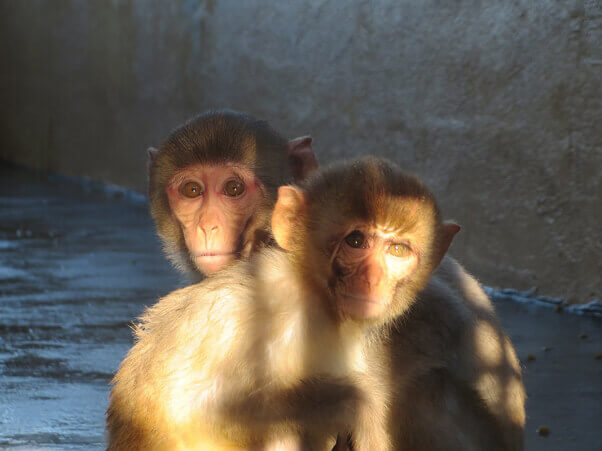The Dark Side of Monkey Business
In 2013, the National Institutes of Health (NIH) made the historic decision to retire the majority of federally owned chimpanzees from use in experiments. While this was a monumental victory for chimpanzees, there are still 110,000 monkeys and other primates imprisoned in U.S. laboratories.
A new PETA eyewitness investigation at a company in Florida that sells monkeys to laboratories is shining a spotlight on the need for urgent action for these animals as well.

For eight months, a witness worked at Florida-based Primate Products, Inc. (PPI), a notorious primate dealer that imports hundreds of monkeys each year and warehouses and then sells them to laboratories. PPI has been awarded federal contracts worth more than $13 million—including by NIH, the Army and the Centers for Disease Control and Prevention. PPI also sends monkeys to universities and contract testing conglomerates across the country
The witness documented that some monkeys with painful injuries, including exposed bones, were left to suffer without adequate veterinary care for days. One monkey was denied adequate medical treatment for an exposed vertebra in her tail for at least a week, despite the fact that the witness had notified a supervisor, a PPI manager and another worker repeatedly about the injury.
Many monkeys were confined to virtually barren concrete pens littered with feces and old food with other stressed and apparently incompatible monkeys, sometimes for months at a time. While monkeys, like humans, are highly social animals, the severe psychological stress of being imprisoned in a small space with strangers and given virtually nothing to do probably contributed to fights among the animals. With no escape, subordinate monkeys lived in constant fear of attack by aggressive monkeys as well as by their human captors.
One monkey, named Loretta by the witness, was left penned with the very monkeys who had injured and apparently terrified her for more than 22 weeks, despite at least 23 written and verbal reports to PPI staff that she was being attacked and appeared to be afraid of the other monkeys. Loretta’s face was frequently lacerated, and she had extensive hair loss. Another monkey, whom the witness named Sweet P, was forced to live for more than two weeks with monkeys who had attacked her. She was finally moved but was then kept isolated in a barren metal cage for 20 days—during which time PPI’s behaviorist admitted to having forgotten about her.
Monkeys were also terrorized by PPI workers who chased them and grabbed them by their sensitive tails. Workers aggressively swung nets at them, yanked them off the fences that they desperately clung to and even hurled them into nets.
Other monkeys were confined all alone to tiny, bleak metal cages. Locked in isolation and denied suitable companionship, which is crucial to their mental and physical health—just as it is to ours—some of these psychologically distressed monkeys rocked back and forth and paced in circles, likely signs of intense boredom and distress.
Though temperatures dipped to as low as 35°F, most monkeys kept outside were denied heat throughout the winter, leading to frostbite and apparently even the death of at least one monkey in an outdoor enclosure.
In 2014 alone, PPI imported 1,000 monkeys from Asia and Africa—63 percent of whom, according to U.S. Fish and Wildlife Service documents, were taken from their families and homes in the wild.
These animals are eventually trucked to government agencies, universities and contract testing laboratories, including facilities that blast monkeys with radiation, drill into their skulls, test sexual lubricants on their rectums and intentionally infect them with an HIV-like virus that causes crippling AIDS-like symptoms, even though every single HIV vaccine developed using monkeys has failed in humans.
Recognizing this chain of abuse, nearly every major airline in the world now refuses to transport monkeys to PPI or any other laboratory or dealer.
PETA is working toward a day when every cage in every laboratory is empty. Readers can make a difference by urging their members of Congress to push the National Institutes of Health to fund more modern and superior non-animal research instead of cruel and ineffective experiments on monkeys and other animals.
Dr. Alka Chandna is a senior laboratory oversight specialist in PETA’s Laboratory Investigations Department, 501 Front St., Norfolk, VA 23510; www.PETA.org.

